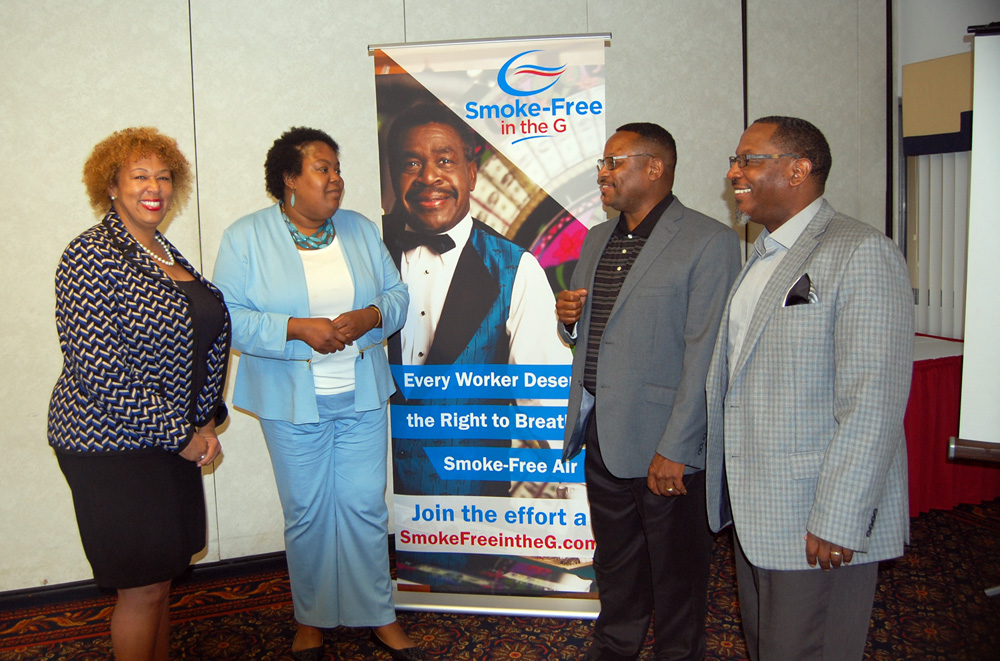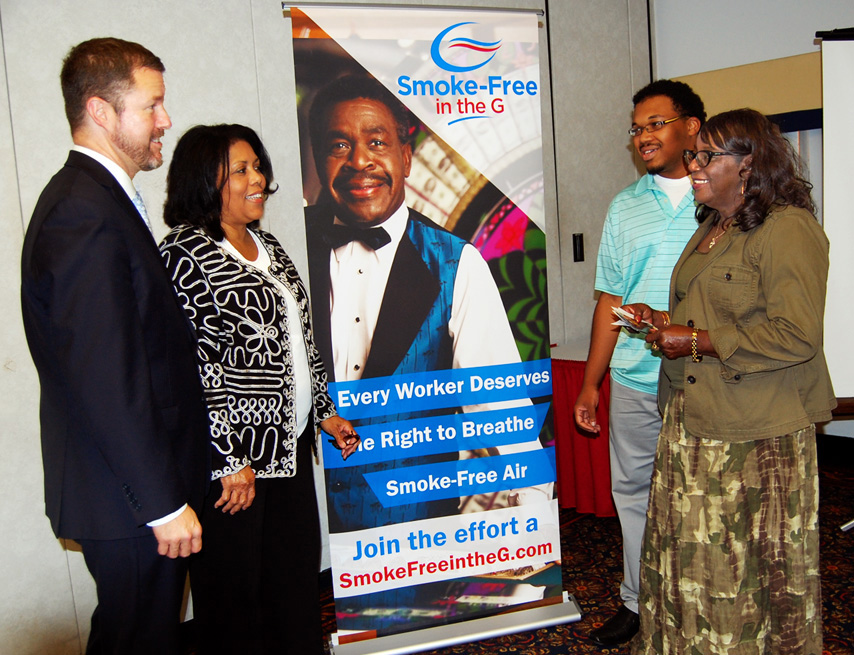
Carol McGruder, (l-r), Danielle Patterson, Delmonte Jefferson, and Pastor John Jackson of Trinity United Church of Christ in Gary
American Heart Assoc. kicks off "Smoke-Free Gary"
Contributed By:The 411 News
Health advocates talk strategies to limit the harms caused by tobacco use
“I wish you well and I’ll be with you all the way,” Indiana State Rep. Charlie Brown told Monday’s gathering of leaders from the health community supporting “Smoke-Free in the G.” The G stands for Gary and it is a campaign led by the American Heart Association, American Stroke Association, and their state and local partners on the dangers of second-hand smoke.
The campaign’s poster is a casino worker with the headline “Every worker deserves the right to breathe smoke-free air.” Northwest Indiana’s casinos are prime targets and Gary’s demographics fit with several strategies the campaign will take to move the issue forward.
"Is it equitable that game dealers and other employees whose jobs are on casino floors must suffer the risks of second-hand smoke, while casino executives work in smoke-free offices?" asked Delmonte Jefferson of the National African American Tobacco Prevention Network.
Jefferson and Carol McGruder, from the African American Tobacco Control Leadership Council, were guest speakers at the kickoff of “Smoke-Free in the G” at the Genesis Center.
Those casino workers, many of them African-Americans are at even more risk, Jefferson said, because they also have the highest incidences of chronic diseases. “Forty-eight percent of blacks suffer from heart and lung disease, obesity, hypertension, and diabetes while the chronic disease rate for the remaining population is at 39%.”
Funded by the Centers for Disease Control and Prevention, Jefferson told of the NAATPN’s research on the tobacco industry’s promotion of cigarettes to communities of color and its “predatory marketing of menthol” products. “Buy-one, get-one-free promotions for menthol cigarettes dominated in African-American communities. White communities didn’t see those promotions and menthol cigarettes were sold at regular or higher prices.”
McGruder lives in the San Francisco-Oakland area. “Keep your eyes on the June 2018 referendum in San Francisco,” she asked. In June, the city’s board of supervisors unanimously approved a ban on flavored tobacco products, including menthol cigarettes and vape products. “Our older folks had Newport and Salem cigarettes, but this new generation has Swisher Sweets,” McGruder said.
A coalition of local business owners financed by the tobacco industry gathered enough signatures for a ballot referendum, putting the ban on hold until voters decide next year.
One of McGruder’s stats: Each year, nearly 45,000 blacks die from tobacco-related illnesses compared to 8,000 from gun violence. “We have groups that advocate for policies to control breast cancer, prostate, heart and lung diseases, but very few working for the control of tobacco,” she said.

Tobacco Free Lake County (l-r) Mike Meska, Irene Phillips, Cynthia Sampson, and Maxie Brown
Notably in recent years, McGruder said, resolutions have been approved by the national offices of Delta Sigma Theta Sorority and the NAACP to control access to tobacco products. Jefferson and McGruder say it will be left to local chapters of those groups to help spread the messages.
Danielle Patterson, Government Relations Director for the American Heart Association, said it is ironic that Indiana legislators can work in a smoke-free environment but deny it to casino and bar workers.
The association supported a $1 per-pack cigarette tax hike in this year’s state legislative session. Health advocates said the tax would be a powerful incentive to quit smoking and encourage the non-initiated to never start. The tax would also provide additional revenue for health care and smoking-cessation programs that have had funding slashed over the past 15 years. “Although the hike wasn’t approved, we’ll bring it back again next year,” Patterson said.
“I’ve tried for years to convince my colleagues,” Brown said about his fellow Indiana House members and state policy makers. “I’m not too optimistic about changes in the General Assembly. For them, this is an issue of health versus revenue and they believe in compromise. There’s a block that worries about a revenue shortfall if casinos are made smoke free.”
Rep. Brown is an influential policy maker on health matters in the state. He has chaired the Indiana House Standing Committee on Public Health; helped write the legislation that created the Healthy Indiana Plan in 2007; and has established a statewide smoking cessation and prevention program.
Indiana is a smoke-free state except in gambling establishments, bars, and private clubs. The state ranks among the top 10 in the U.S. with the most smokers.
“Smoke-free air is a big ask, but attainable,” said Irene Phillips of the Lake County Community Tobacco Prevention and Cessation Coalition, pointing to the 1998 Master Tobacco Settlement between 46 states and the nation’s 5 largest tobacco companies.
Guidelines were set on the advertising, marketing and promotion of tobacco products. The tobacco companies guaranteed a minimum payment of $206 billion over the first 25 years to the states to fund anti-smoking campaigns and public health programs. This group deal exempted the industry from legal liability for the harm caused by tobacco use.
An indicator that the tobacco industry can be held accountable: In 2010, the family of Marie Evans was awarded $35 million in a lawsuit against Lorillard Tobacco. A lifelong smoker who died of lung cancer in 2002, Evans was introduced to cigarettes as a child when free samples were handed out at her Roxbury housing project in Boston.
Story Posted:10/05/2017
|